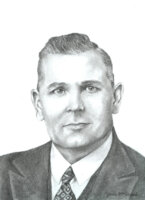Inductees

Robert James Scott
(1900 - 1946)
Inducted in 2023
Origin: Huron County
Nominated by: Huron County Federation of Agriculture
Specialty: Co-operatives
Robert Scott was one of the most dynamic and influential men in Canadian agriculture through the Depression and World War 2 (WW2). His missionary zeal in his work to organize Ontario farmers into cooperative associations was an important milestone for Ontario agribusiness.
He farmed near Belgrave and, at the age of 20, he became secretary of the Belgrave United Farmers of Ontario (UFO). The UFO was a rural populist political party which, in 1919, formed the provincial government under Ernest Drury. With Scott as president of the UFO from 1930-35, the party introduced a minimum wage for women, brought electricity to much of rural Ontario and established a provincial bank to lend money to farmers at a reduced rate.
Scott went on to join the United Farmers’ Cooperative (UFC) and was its president from 1937-45. Only someone of Scott’s zeal and persuasiveness could convince so many farmers across Ontario, at hundreds of meetings, to join cooperatives to pool their resources to purchase grain elevators, stock yards, feed mills, lumber yards and more. Between 1938 and 1944, he organized cooperatives in Hensall, Exeter, Seaforth, Clinton and Blyth. As the UFC president, he lobbied provincial and federal governments to guarantee farmers fairer railway freight rates to keep their products competitive. After the outbreak of WW2, Scott lobbied the federal government to improve the prices of wheat, butter, eggs, and meat to ensure an adequate food supply for both the Canadian military and the citizens at home.
By 1945, the Huron County cooperatives were a thriving success, purchasing a huge variety of agricultural supplies to sell to farmer members at discounted prices. Locally grown grain was stored in co-op silos. Farm produce and livestock were brought to co-op owned railheads and shipped with special rates. The production of farm commodities saw a massive increase in spite of an acute shortage of farm labour. Thanks to Robert Scott’s efforts, the cooperative movement in Ontario had been established as a strong farmer owned and operated business model which exists today.
In 1945, Robert was appointed by Premier George Drew as a commissioner assessing agricultural conditions in Ontario, but just as he reached the pinnacle of his influence, he died of heart failure at the age of 46. It is fitting that his lasting legacies to Ontario agriculture be acknowledged by his entry into the Ontario Agricultural Hall of Fame.

